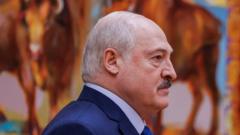In Belarus, the atmosphere leading to the January 2025 election showcases minimal campaigning and subdued public interest, as Alexander Lukashenko prepares for what many deem a predetermined victory amidst an oppressive political climate.
'Belarus Presides Over Uncertain Election Landscape as Lukashenko Poised to Win Again'

'Belarus Presides Over Uncertain Election Landscape as Lukashenko Poised to Win Again'
Amid a bleak winter atmosphere, Belarusians express resignation toward the upcoming presidential election, revealing concerns over stability under Lukashenko’s unwavering rule.
In Belarus, the approach of the January 2025 presidential election can hardly be felt — no vibrant campaign posters adorn the streets of Minsk, and the public’s engagement with electoral processes seems nearly non-existent. The somber winter weather only enhances the air of inactivity and inevitability that surrounds the upcoming ballot.
For more than 30 years, Alexander Lukashenko has maintained his hold on power, often labeled as “Europe’s last dictator.” His reign reflects a regime that presents its continuity as a form of "Belarusian democracy," a notion hotly contested by his opponents. Observers and citizens alike are bracing for what is perceived to be a predetermined result, with Lukashenko expected to secure a seventh consecutive term in office.
Interestingly, even the president himself downplays the significance of the electoral campaign. In a recent gathering at the Minsk Automobile Plant, Lukashenko nonchalantly claimed, "I'm not following the election campaign. I've got no time," while receiving an axe as a gift from workers, drawing applause from the audience.
The political landscape recalls the unrest of 2020, when the official announcement of an 80% victory for Lukashenko triggered mass protests against alleged electoral fraud. The backlash led to extensive crackdowns by law enforcement, resulting in numerous arrests and a repression that extinguished dissent with Russian support. Consequently, major Western nations, including the UK and the EU, have yet to recognize Lukashenko's legitimacy as president.
As the election campaign unfolds, the European Parliament has labeled the forthcoming election a "sham," noting the extreme repression that undermines democratic standards. Lukashenko himself dismissed concerns about opposition figures being imprisoned or exiled, questioning the identities and relevance of these supposed leaders.
Though four other candidates are on the ballot, the opposition struggles to present a genuine challenge. Take Sergei Syrankov, the leader of the Communist Party, whose campaign slogan is paradoxically “Not instead of, but together with Lukashenko!” His declaration reflects a consensus among candidates that recognizes Lukashenko’s dominance rather than attempting to overthrow it.
Oleg Gaidukevich, leader of the right-wing Liberal-Democratic Party, similarly acknowledges Lukashenko's guaranteed success in the election, admitting their role is more about maintaining presence in the political structure for future opportunities.
Despite the evident lack of enthusiasm or viable alternatives, some citizens express a preference for continuity, citing fears of instability should a change in leadership occur. In discussions with residents of smaller towns like Oktyabrskaya, the prevailing sentiment is one of cautious adherence to the status quo. “God forbid we should end up like Ukraine,” voiced one local, encapsulating the anxieties over potential upheaval in a region already grappling with geopolitical uncertainties.
In this atmosphere of resignation and concern, Lukashenko's regime seems set to continue, buoyed by the populace’s fear of instability, the suppression of dissent, and a landscape devoid of genuine political challengers.
For more than 30 years, Alexander Lukashenko has maintained his hold on power, often labeled as “Europe’s last dictator.” His reign reflects a regime that presents its continuity as a form of "Belarusian democracy," a notion hotly contested by his opponents. Observers and citizens alike are bracing for what is perceived to be a predetermined result, with Lukashenko expected to secure a seventh consecutive term in office.
Interestingly, even the president himself downplays the significance of the electoral campaign. In a recent gathering at the Minsk Automobile Plant, Lukashenko nonchalantly claimed, "I'm not following the election campaign. I've got no time," while receiving an axe as a gift from workers, drawing applause from the audience.
The political landscape recalls the unrest of 2020, when the official announcement of an 80% victory for Lukashenko triggered mass protests against alleged electoral fraud. The backlash led to extensive crackdowns by law enforcement, resulting in numerous arrests and a repression that extinguished dissent with Russian support. Consequently, major Western nations, including the UK and the EU, have yet to recognize Lukashenko's legitimacy as president.
As the election campaign unfolds, the European Parliament has labeled the forthcoming election a "sham," noting the extreme repression that undermines democratic standards. Lukashenko himself dismissed concerns about opposition figures being imprisoned or exiled, questioning the identities and relevance of these supposed leaders.
Though four other candidates are on the ballot, the opposition struggles to present a genuine challenge. Take Sergei Syrankov, the leader of the Communist Party, whose campaign slogan is paradoxically “Not instead of, but together with Lukashenko!” His declaration reflects a consensus among candidates that recognizes Lukashenko’s dominance rather than attempting to overthrow it.
Oleg Gaidukevich, leader of the right-wing Liberal-Democratic Party, similarly acknowledges Lukashenko's guaranteed success in the election, admitting their role is more about maintaining presence in the political structure for future opportunities.
Despite the evident lack of enthusiasm or viable alternatives, some citizens express a preference for continuity, citing fears of instability should a change in leadership occur. In discussions with residents of smaller towns like Oktyabrskaya, the prevailing sentiment is one of cautious adherence to the status quo. “God forbid we should end up like Ukraine,” voiced one local, encapsulating the anxieties over potential upheaval in a region already grappling with geopolitical uncertainties.
In this atmosphere of resignation and concern, Lukashenko's regime seems set to continue, buoyed by the populace’s fear of instability, the suppression of dissent, and a landscape devoid of genuine political challengers.






















